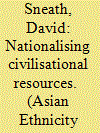| Srl | Item |
| 1 |
ID:
136152


|
|
|
|
|
| Summary/Abstract |
For two decades, the metaphor of ‘hollowing out’ dominated discussions about the changing role of the state in delivering public services. Today, this metaphor no longer captures important contemporary developments. European Union policy has expanded deeper and deeper into public service sectors, increasingly constraining government's capacities to deliver these services. I suggest a new metaphor to capture this: straitjacketing the state. People are straitjacketed when they are perceived to be at risk of damaging themselves through self-harm. Straitjacketing the state occurs when a state signs up to a new set of supranational rules which purportedly will help avoid it damaging itself, by restricting room for localised inefficient practices. However, due to the strength of the straitjacket, governments become significantly restricted in choosing policies for domestic implementation according to their preferences.
|
|
|
|
|
|
|
|
|
|
|
|
|
|
|
|
| 2 |
ID:
135770


|
|
|
|
|
| Summary/Abstract |
This paper is concerned with the historical process by which elements drawn from a religious ‘civilisation’ have been reinvented as specifically national phenomena. It examines the Mongolian state ceremonies for sacred mountains conducted by the President as an example of the reinvention of an institution originally produced by the wider culture or civilisation of the Buddhist ecumene encompassing both Mongolia and Tibet. Such ritual, I argue, can be thought of as ‘cosmopolitical’ in that sense that they engaged with non-humans as actors in the political arena. Furthermore, the contemporary reinvention of these practices has generated a space for a very different, but also cosmopolitical, register for conceiving of relations between human persons and the landscape.
|
|
|
|
|
|
|
|
|
|
|
|
|
|
|
|
| 3 |
ID:
134725


|
|
|
|
|
| Summary/Abstract |
Deleuze’s legacy in the social sciences in general and in international studies in particular has been predominantly shaped by postmodernist and poststructuralist readings derived largely from American literary criticism. This has led to the proliferation of various Deleuzo-Guattarian terms such as rhizome and war machine, as well as an ill-defined ‘Deleuzian approach’. Although productive in their own way, such readings of Deleuze’s philosophy obscure a profound and elegant theory (or super-theory) of the world that offers considerable innovations in efforts to explain and understand the complex and integrated world we live in. The article argues for a reading of Deleuze’s work committed to his univocal ontology and his metaphysical system of the virtual and the actual. It is argued that this approach addresses some of the most vexing questions of international studies and suggests methodologically sound avenues of further study.
|
|
|
|
|
|
|
|
|
|
|
|
|
|
|
|
| 4 |
ID:
134470


|
|
|
|
|
| Summary/Abstract |
This article offers first a brief commentary on Karl Deutsch and his collaborators’ development of the concept of security community, before moving to a critical review of constructivist attempts by Adler, Barnett and their colleagues at resurrecting it. The article makes the case that while the serious effort to give security community a new life is laudable, the appropriation also renders the concept at once theoretically complex and methodologically superficial. Drawing constructive lessons from the previous research, it seeks to demonstrate the potential of the security communities research provided that it (1) restores the Deutschian ethos of rigorous, transparent, collective and transdisciplinary research; (2) takes seriously the challenge to the realist paradigm by zooming in and out of the modern state when thinking about security community; and (3) in addition to processes of integration investigates more thoroughly also the processes of disintegration.
|
|
|
|
|
|
|
|
|
|
|
|
|
|
|
|